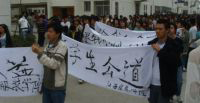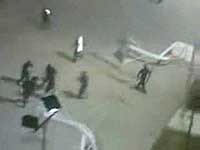




Armed police were patrolling at least two privately run vocational colleges in the provincial capital Nanchang on Monday, after preventing a planned demonstration from taking place in the city Sunday, students told RFA’s Mandarin service.
“Originally the students had planned a large demonstration in Nanchang of about 10,000 people, but the police had already moved in before it got started and wouldn’t let people leave the campus,” one student said.
HONG KONG—Authorities in the eastern Chinese province of Jiangxi appeared Monday to have thwarted a planned protest by students angry at the status of their degree certificates.
Things got pretty serious because so many of us have been working hard to get into university for so many years, and now we find that when we do graduate our degree paper is just a blank sheet of paper.
“So I don’t know whether anything took place at all.”
Others who made it to Bayi Square, the planned city center rendezvous for the start of the march Sunday morning, found a phalanx of armed police waiting for them.
“We got there but there were already so many police we couldn’t get through,” another student told reporter Ding Xiao.
“There was nothing wrong with our reasons for demonstrating. We were just looking for justice. But they weren’t having it. We haven’t had a single attempt at explanation from the colleges concerned,” he said.
Students and police clashed in the city early last week following increasingly angry protests after students learned their degree certificates wouldn’t be recognized.
Mobile phone video and photos shot by eyewitnesses showed campus buildings and vehicles ablaze, cars upturned, and large crowds in clashes with riot police armed with truncheons and shields.
“Things got pretty serious because so many of us have been working hard to get into university for so many years, and now we find that when we do graduate our degree paper is just a blank sheet of paper because the government won’t recognize it. It’s useless,” a student told reporter Lin Di on Friday.
When all these students get to graduation they are finding it very hard to find jobs. There is a huge amount of dissatisfaction among students nowadays and that has been expressed in these riots.
“Things were getting out of hand and then they sent in the armed police. Even teachers were injured. But that kind of news doesn’t get out mostly. So they called in the police.”
An official who answered the phone at the Nanchang municipal police department said he was unaware of the reports of rioting. “Not everything you read on the Internet is true,” he said.
Professor Hu Xingdou of the Beijing University of Science and Technology said the students were essentially in the right.
“A lot of university officials don’t play a straight game nowadays. It’s a con. They make it sound as if there are many benefits and advantages when they’re recruiting students, but actually these benefits are non-existent,” he told a discussion panel.
“This has to do with the increasing level of privatization in the education sector in recent years, and the growing economic power of students. It’s the result of a society-wide obsession with money,” Hu said.
China’s leaders, who are increasingly concerned about the rise in popular unrest around the country in recent years, are reportedly keeping a worried eye on developments in Jiangxi.
Hu said the Jiangxi riots had profound implications for China’s stability.

“There are a lot of factors which affect social stability nowadays, like the growing gap between rich and poor, the problem of corruption, and industrial disputes.”
But he said the protests had little in common with the student-led pro-democracy movement of 1989.
“Back then, they were united in their hatred of corruption. You could say that they were political. These protests aren’t very political because today’s university students aren’t very interested in politics,” he told reporter Shen Hua.
Retired Shandong University professor Sun Wenguang agreed, saying that political activism was more common among faculty back in 1989, before the government began a large scale suppression of politically active academics. “Now they’ll kick someone out as soon as they start anything like that,” he said.
Sun blamed the rapid expansion rate at Chinese universities. “When all these students get to graduation they are finding it very hard to find jobs.”
“There is a huge amount of dissatisfaction among students nowadays and that has been expressed in these riots.”
Original reporting in Mandarin by Lin Di, Ding Xiao, and Shen Hua. RFA Mandarin service director: Jennifer Chou. Translated and written in English by Luisetta Mudie. Edited by Sarah Jackson-Han.